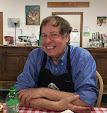Remembering Kupernikus: Coffee with community
Coffeehouses may seem an unlikely place for social work. But they've
been a part of social work since the beginning. In fact, a coffeehouse
was an early addition to the Hull House complex.
I've written before about some of the modern coffeeshops which carry
on this tradition (including the Hard Times in Minneapolis). In
important ways, these places are both community centers for their
neighborhoods and extensions of social service agencies.
Kupernikus in St.Paul was another example of a coffeeshop which
mirrored the ideas of social work's founders. Open during the 1990s,
it was located in a cavernous warehouse in the Lowertown district of
the city. Like the Hard Times, it played a special role in being a
safe place for homeless young people.
Anna Stanley, a friend of mine since the 1960s, was a key figure in
Kupernikus. A veteran activist (we met at a sit-in), she was recruited
to to work at the coffeehouse because of her years of work with young
people. She had been a teacher at an alternative high school and part
of the artistic team which created the Phillips Gateway in Minneapolis.
Anna lived upstairs from Kupernikus and could often be found talking
with young people during "off hours." She parked her car on the street
and left it unlocked in case someone needed a place to sleep. She
would leave a few cigarettes and some change on the dashboard. "All I
asked was that when you could you replaced what you took."
People liked the sense of community and the informality of Kupernikus,
Anna said. Her comments are echoed in the work of a number of writers,
including the authors of "Urban sanctuaries: Neighborhood
organizations in the lives and futures of inner city youth."
The authors point out that many social service agencies concentrate on
delivering services. But that's not enough. Many people, especially
young people, want the experience of community as well.
The authors suggest that instead of providing services in agency
settings, social workers should consider moving into community
settings such as coffeeshops to do their work. That's exactly what
Kupernikus tried to do.
Kupernikus is gone now. But it does live on in film. It was the
setting for an independent movie called "Cafe Donna." Inspired in part
by the Hard Times Coffeeshop, it tells the story of a coffeeshop
threatened with closing by a city council which didn't like its work
with youth.
COFFEESHOP IS NOW
THE PLACE TO MEET
Coffeeshops are replacing bars as the place to start a relationship.
That's the thrust of a recent article in the Minneapolis Star Tribune.
Under the headline "Relationships: Hot (coffee) date," writer Gail
Rosenblum extols the benefits of a coffeeshop as the meeting spot.
Sidebars offer a "How to guide for a coffeeshop date" and "Best
independent coffeeshops in the Twin Cities." You can find the story
online at www.startribune.com/218/story/933072.html. (You may have to
register to read the full story.)
HERE'S A CUP OF
COFFEE SLOGAN
Small town comfort in a cup -- Yeti's Grind, Eagle, CO
Red, white and brew -- javawear.com
A perk you deserve -- Dark Canyon Coffee Co, Rapid City, SD
Peace and latte to all men -- Costa Coffee, London, England
Don't settle for the average Joe -- Denver City Search
Life is too short for bad coffee -- Kaladi's, Sioux Falls, SD

